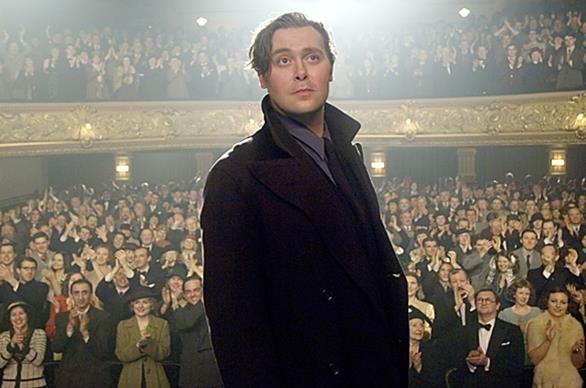
In a film bound to annoy grammar pedants (as it’s about a literary figure, one might have thought the film’s makers might have considered the fact that this might alienate their core audience - people who like the English language) teen-nip Zac Efron joins the cast of Orson Welles’s groundbreaking 1937 production of Julius Caesar. A strange marriage of Disney star and high-brow culture, this promised to be the first introduction for many fourteen-year old girls into the oeuvre of one of the twentieth century’s undoubted geniuses.
As you can tell, I had one major reservation about Me and Orson Welles – the presence of Zac Efron. Whenever someone tell me that they like Zac Efron (and a shocking number of people seem to feel the need to make this confession), I always wonder if they’re gently trying to break it to me that they’re a paedophile, or perhaps have the mental age of six. What if I, too, turned out to like Zac Efron after all my sneering?
This, of course, is exactly what happened. Not that I fancy Zac Efron – there’s still something weird about a grown woman fancying the star of ‘High School Musical’ (Yes, I know he’s the same age as me – the usual defence for this depravity), but not only did I happily watch him on screen for an entire film, I actually found his character incredibly likable. And he can act. Who’d have thought it?
Anyway, the film. Starry-eyed Richard (Efron) is desperate to be an as-yet unspecified something in the Arts. It definitely has a capital letter to him. He tries to chat up a girl so wet that later in the film she is actually found reciting ‘Ode on a Grecian Urn’ in front of – you’ll never guess it – a Grecian urn! Not only does she do this in public, but she also obviously doesn’t understand the complexities of poem and recites it with an awed breathlessness that made me want to throw things at her. Thankfully, although he gets her short story sent to the New Yorker, he basically forgets about her about half an hour after meeting her when he manages to blag his way into Welles’s cast by pretending he can play the ukulele, and starts making eyes at Sonja (Clare Danes) – the theatre’s general dogsbody – albeit an incredibly foxy one.
All the men in the cast want to get into Sonja’s pants, but she’s only interested in sex if it gets her somewhere. Despite the fact that this, predictably, breaks Zac’s heart a little bit (he’s 17 – he gets over it pretty quickly), Sonja’s sleeping her way to the top was treated with admirable moral apathy – she was neither a heartless femme-fatale, nor a victim being used for sex, but an admirably ambitious girl who knows how to get what she wants. And, the film suggested, she was going to achieve it too.
Christian McKay as Orson Welles is, as most other critics have pointed out, brilliant. Not only does he look spookily like a young Orson Welles, he also manages to convey Welles’s extremes without turning into a pantomime act. He convincingly negotiates between Orson’s monomania and tyranny and the chaotic, haphazard and nail-biting genius that made subjection to his tyranny not only bearable but desirable. Welles’s modern dress production had the cast in military uniforms and giving raised arm salutes to a Caesar who bore more than a passing resemblance to Mussolini - a brave and prescient political point to be making in 1937 – and cast himself as the play’s moral core – the liberal Brutus. Whilst one has to admire his deft political point, you can’t help thinking that the despotic Welles perhaps had more in common with Mussolini than he would have cared to admit.
The recreation of the first night of the play is the absolute highlight - a brilliant reminder of just how fantastic a director Welles was. The scene where the poet, Cinna, is submerged by an angry mob and disappears, utterly destroyed, elicited a gasp from its first audience, and, even though we’ve already seen it planned on screen, it loses none of its power to shock.
Unfortunately, having blown his chance at acting (and to be honest, he’s a pretty poor actor – he can’t even remember the most basic of lines) Richard ends back up with Gretchen, the Keats-spouting drip. Sonja managed to get her story personally to the editor, and she is getting published. According to the New Yorker, she is both witty and profound. Presumably she is better on paper than in life. One might think that both Richard and Gretchen might have learnt some sobering lessons about the arts world – the importance of networking (often over talent) and the complete lack of job security. However, this doesn’t seem to have blunted their misty-eyed enthusiasm, and the film ends with Richard declaring his ambition to ‘do something vaguely related to the arts’ (this is my paraphrase – his actual words were so vague that that woolly phrase is actually a clarification). At the same time, a pigeon (the New York, 20th century version of a dove) escapes the museum they have just left and soars upward, so presumably this heavy-handed symbolism means that his declaration is meant to be uplifting. Having had such vaguely realised dreams myself at the age of 17, I merely found it slightly depressing.
Christ, we're actually in the 21st century, not the 20th. By ten years. No wonder I can't remember my own age.
ReplyDelete